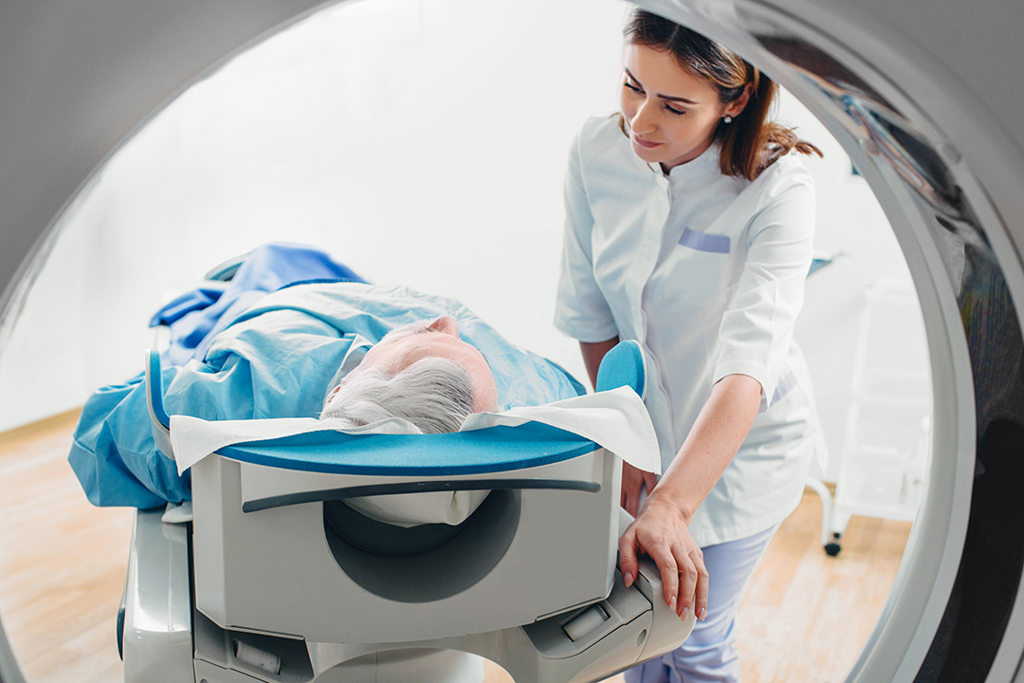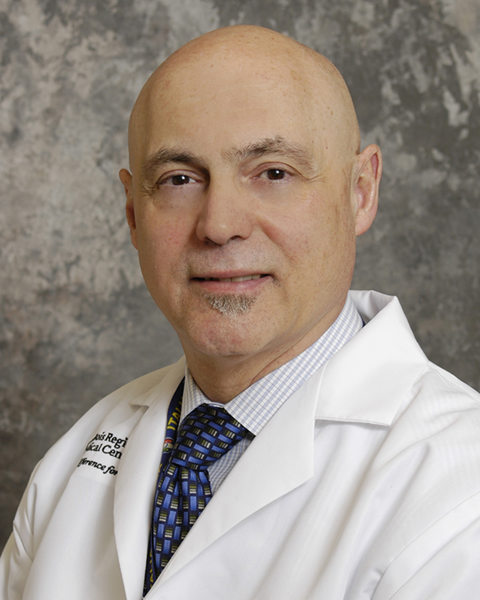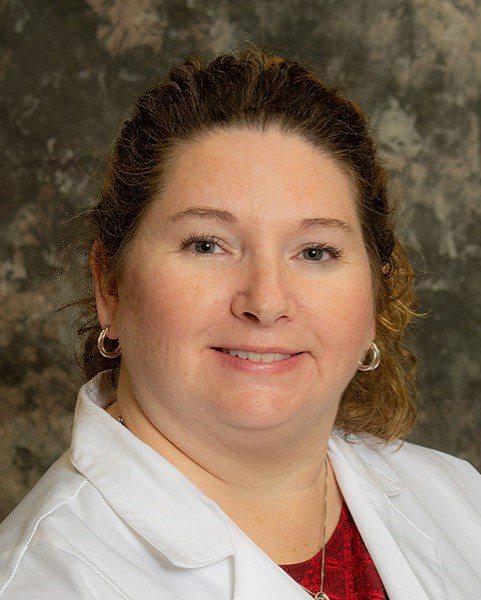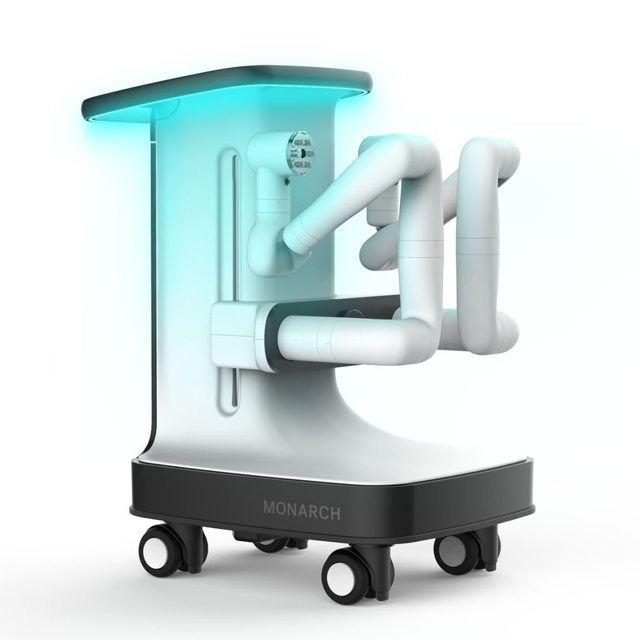
Detecting Lung Cancer Early Saves Lives
Lung Cancer Screening
Lung cancer is the number one cancer killer in the United States, causing more deaths than breast, colon, and prostate cancer combined. New lung cancer screening tests and treatments for early stage lung cancer are saving more lives than ever. If you are at risk of developing lung cancer, we can assess your risk and recommend appropriate screenings. People at risk of lung cancer are those with a family history, people who smoke or have smoked in the past, and people who have been exposed to asbestos, radon, or other environmental toxins. Even people without any of those risks can develop lung cancer, so it’s also important that people with symptoms see their primary care providers.
Lung Cancer Screenings
Penn Highlands offers several tests to help detect lung cancer and to start lung cancer treatment as soon as possible. In recognition of our dedication in early detection and treatment of lung cancer, we have been named a Center of Excellence with the Lung Cancer Alliance and a UPMC Center of Excellence for Lung Cancer Screening.
- CT lung cancer screening: Penn Highlands Healthcare is the first healthcare facility in Central Pennsylvania to offer CT lung cancer screening to detect lung cancer early, before it even has a chance to cause symptoms. We offer low-dose CT lung screening for high-risk individuals at an affordable cost. Low-dose CT lung scans are conducted at The Lung Center at all four Penn Highlands hospitals in Brookville, Clearfield, DuBois, and Elk.
- Monarch Platform: We use the Monarch Platform and its accessories, including flexible robotics and micro-instrumentation for bronchoscopic procedures to detect and treat lung cancer. The bendable bronchoscope, which contains a tiny camera, gives pulmonologists greater visualization of and access to patient airways. During the procedure, the surgeon uses the camera and robotic controls to navigate the small tubes in the lungs and then uses a needle to extract a tissue sample for biopsy, a test to confirm cancer.
- Lung biopsy with SPiN Access Catheter™: SPiN Access Catheter is a new navigated catheter that helps physicians diagnose and guide treatment of smaller, early-stage lung cancer lesions. The Lung Center of Penn Highlands Healthcare was the first facility ever to use this new technology, which makes early detection and treatment of lung cancer more likely than with traditional bronchoscopy. The catheter is used to biopsy small lung nodules, which can be the size of a pea. Due to the normal motion caused by breathing, 46 percent of these nodules move a distance greater than the size of the nodule making detection difficult. To help account for this movement, the SPiN Access Catheter offers a more accurate 3D map for navigation and respiratory gating, which uses computer software to guide the biopsy sampling instruments as a patient breathes.

Pulmonology
Critical Care Medicine
Penn Highlands Lung Center - State College
A Service of Penn Highlands Huntingdon
Penn Highlands Lung Center - Philipsburg
A Service of Penn Highlands DuBois
The Lung Center
Penn Highlands Lung Center - Clearfield
A Service of Penn Highlands DuBois
Penn Highlands Lung Center - Brookville
A Service of Penn Highlands DuBois
Penn Highlands Lung Center - Huntingdon
Penn Highlands Lung Center - Clarion
A Service of Penn Highlands DuBois

Pulmonology
Penn Highlands Lung Center - Brookville
A Service of Penn Highlands DuBois
Penn Highlands Lung Center - Clearfield
A Service of Penn Highlands DuBois
Penn Highlands Lung Center - Huntingdon
Penn Highlands Lung Center - Philipsburg
A Service of Penn Highlands DuBois
Penn Highlands Lung Center - Punxsutawney
A Service of Penn Highlands DuBois
Penn Highlands Lung Center - State College
A Service of Penn Highlands Huntingdon
The Lung Center
Penn Highlands Lung Center - St. Marys
A Service of Penn Highlands DuBois

Pulmonology
Penn Highlands Lung Center - St. Marys
A Service of Penn Highlands DuBois
Penn Highlands Lung Center - Huntingdon
The Lung Center
Penn Highlands Lung Center - State College
A Service of Penn Highlands Huntingdon
Penn Highlands Lung Center - Clearfield
A Service of Penn Highlands DuBois
Penn Highlands Lung Center - Philipsburg
A Service of Penn Highlands DuBois

Sleep Medicine
Pulmonology
Critical Care Medicine
Penn Highlands Pulmonology and Sleep Medicine - St. Marys
A Service of Penn Highlands DuBois
Penn Highlands Pulmonology and Sleep Medicine - DuBois
A Service of Penn Highlands DuBois

Sleep Medicine
Pulmonology
Penn Highlands Lung Center - St. Marys
A Service of Penn Highlands DuBois
Penn Highlands Lung Center - Philipsburg
A Service of Penn Highlands DuBois
The Lung Center
Penn Highlands Lung Center - Punxsutawney
A Service of Penn Highlands DuBois

Pulmonology
Penn Highlands Lung Center - Clarion
A Service of Penn Highlands DuBois
The Lung Center
Penn Highlands Lung Center - Clearfield
A Service of Penn Highlands DuBois
Penn Highlands Lung Center - Brookville
A Service of Penn Highlands DuBois
Penn Highlands Lung Center - St. Marys
A Service of Penn Highlands DuBois
Penn Highlands Lung Center - Huntingdon
Penn Highlands Lung Center - Punxsutawney
A Service of Penn Highlands DuBois

Pulmonology
Penn Highlands Lung Center - State College
A Service of Penn Highlands Huntingdon
Penn Highlands Lung Center - Philipsburg
A Service of Penn Highlands DuBois
The Lung Center
Penn Highlands Lung Center - Clearfield
A Service of Penn Highlands DuBois
Penn Highlands Lung Center - Huntingdon

Pulmonology
Penn Highlands Lung Center - Huntingdon
The Lung Center
Penn Highlands Lung Center - Clearfield
A Service of Penn Highlands DuBois
Penn Highlands Lung Center - St. Marys
A Service of Penn Highlands DuBois

Pulmonology
Penn Highlands Pulmonology and Sleep Medicine - St. Marys
A Service of Penn Highlands DuBois
Penn Highlands Pulmonology and Sleep Medicine - DuBois
A Service of Penn Highlands DuBois
Benefits of CT Lung Cancer Screening
In people at risk of developing lung cancer, a CT lung cancer screening can significantly reduce the chance of lung cancer-related death by finding the cancer early when it is most likely to respond to treatment. The lung cancer screening is performed using a CT scan, which is a non-invasive imaging test. Specifically, the screening uses a low-dose CT scan, which uses a very small dose of radiation to take pictures of the lungs. The dose of radiation is significantly lower than a standard chest CT scan.
Who is eligible for CT lung cancer screening?
To be a candidate for CT lung screening, you must meet specific criteria. However, because it can be difficult to know precisely who qualifies, we can help you assess your risk and the screening test that is best for you. Candidates for CT lung screening including those who are:
- 55 to 80 year old, with at least a 30 pack-year smoking history who continue to smoke or who quit less that 15 years ago. One pack year is equal to smoking 20 cigarettes, or one pack, everyday for one year.
- 50 years or older and with at least 20 pack-years and one or more of these risk factors: long-term exposure to asbestos, asbestos-related lung disease, chronic obstructive pulmonary disease (COPD), pulmonary fibrosis, family history (parent, sibling or child) of lung cancer, long-term exposure to silica, cadmium, arsenic, beryllium, chromium, diesel fumes, nickel, coal smoke and soot.
Cost of CT Lung Cancer Screening
Penn Highlands Healthcare provides this lung cancer screening for as little as $99. Most insurance companies provide coverage for this screening if you meet the criteria. If your insurance provider requires a prior authorization for this screening, we will provide that. If your insurance provider denies coverage, you will be responsible for the $99 cost.


